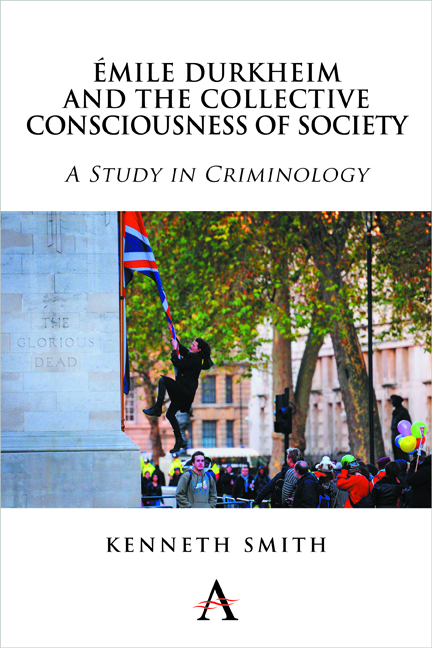Book contents
- Frontmatter
- Dedication
- Contents
- Epigraph
- Preface
- Introduction
- Part I The Concept of the Collective Consciousness of Society
- Part II The Form of the Collective Consciousness
- Preface to Part II
- Introduction to Part II: The Conditions of the Collective Consciousness of Society
- 4 The Form that the Collective Consciousness(es) of Society Takes in a Late-Industrial Society: I. Macro-sociological or ‘General’ Characteristics
- 5 The State as the ‘Organ’ of the Common Consciousness
- 6 ‘The Rule-of-Law’: A Case Study
- 7 The Form that the Collective Consciousness Takes in Early Twenty-First Century Britain: II. Micro-sociological, Individual or Small-Scale Factors
- Conclusion to Part II
- Part III Durkheim on Crime and Punishment
- Part IV Social Fact or Social Phenomenon? Durkheim's Concept of the Collective Consciousness as a ‘Social Fact’
- Part V Some Problems with Durkheim's Concept of the Common and Collective Consciousness
- Conclusion
- Appendix: On Paying a Debt to Society
- Notes
- References
- Index
6 - ‘The Rule-of-Law’: A Case Study
from Part II - The Form of the Collective Consciousness
Published online by Cambridge University Press: 05 October 2014
- Frontmatter
- Dedication
- Contents
- Epigraph
- Preface
- Introduction
- Part I The Concept of the Collective Consciousness of Society
- Part II The Form of the Collective Consciousness
- Preface to Part II
- Introduction to Part II: The Conditions of the Collective Consciousness of Society
- 4 The Form that the Collective Consciousness(es) of Society Takes in a Late-Industrial Society: I. Macro-sociological or ‘General’ Characteristics
- 5 The State as the ‘Organ’ of the Common Consciousness
- 6 ‘The Rule-of-Law’: A Case Study
- 7 The Form that the Collective Consciousness Takes in Early Twenty-First Century Britain: II. Micro-sociological, Individual or Small-Scale Factors
- Conclusion to Part II
- Part III Durkheim on Crime and Punishment
- Part IV Social Fact or Social Phenomenon? Durkheim's Concept of the Collective Consciousness as a ‘Social Fact’
- Part V Some Problems with Durkheim's Concept of the Common and Collective Consciousness
- Conclusion
- Appendix: On Paying a Debt to Society
- Notes
- References
- Index
Summary
Before we leave the realms of what Durkheim describes as the general characteristics of the collective consciousness of society – the macro-sociological features we have considered above – and go on to look in greater detail at those other very strong, but smaller-scale or ‘individual’ characteristics which might serve this purpose, there is one other very strong macro-sociological candidate that I want to consider for inclusion under the heading of ‘rules forbidding acts contrary to the sentiments of the collectivity’ and this is one which, interestingly enough, is in fact entirely missing from Durkheim's discussion of this question in The Division of Labour. I am referring here to what Barbara Hudson (1998), calls the role of the ‘Rule-of-Law’ in society. Departing then for the moment from Durkheim's list of all possible candidates for inclusion in the collective consciousness of society (table v.1 in The Division of Labour), I want to emphasize once again how revealing it is that any discussion of this point is conspicuously lacking from Durkheim's own account of this matter, at least as outlined by him in The Division of Labour, and that the reason for this is almost certainly due to the analytical distinction that Durkheim makes between the disciplinary function in society and the collective consciousness as such. The criminal law is part of the disciplinary function of society and as such, as we have seen, it is not part of Durkheim's concept of the collective consciousness.
- Type
- Chapter
- Information
- Publisher: Anthem PressPrint publication year: 2014



